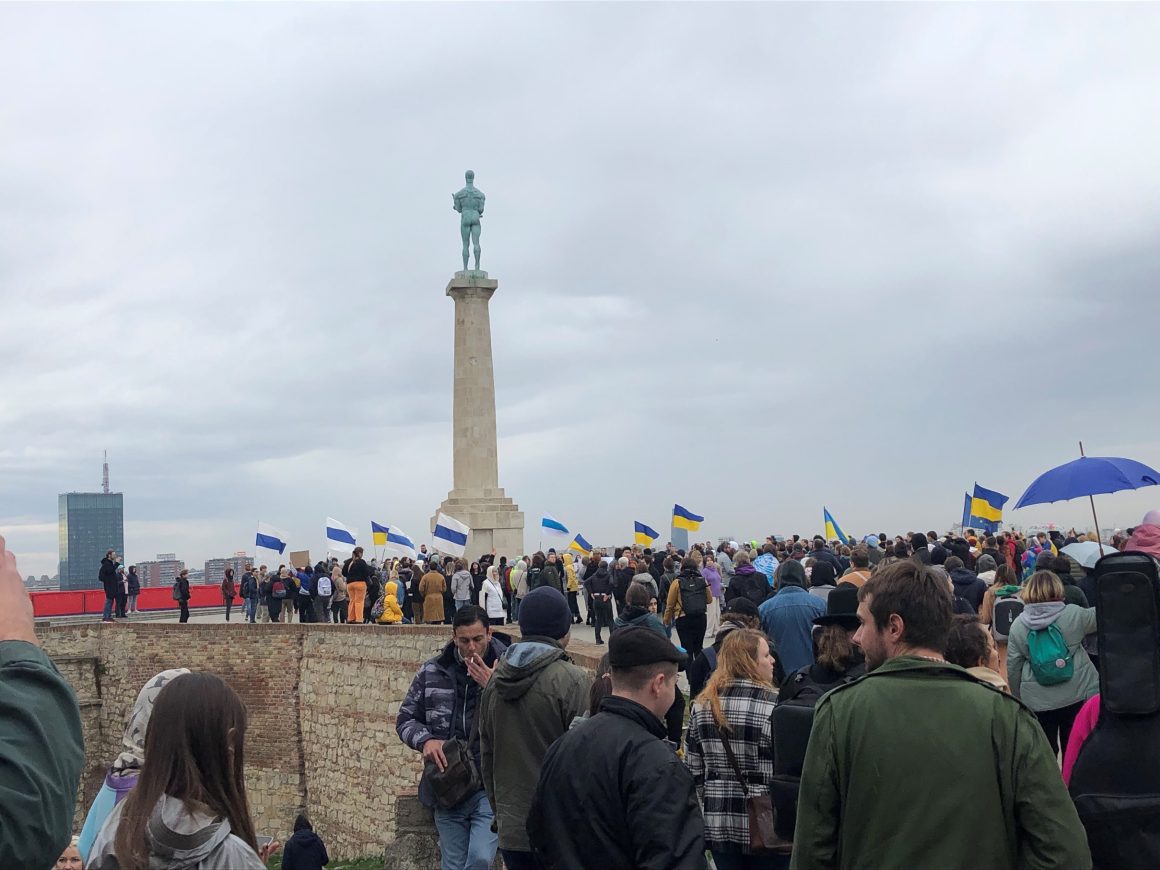On the second anniversary of the war on Ukraine, young Russians, Ukrainians, Belarusians, and Serbians gathered in the central Republic Square in Belgrade and having lit candles for all the victims of the war on Ukraine, engaged in a protest march to the confluence of the Sava river into the Danube at the plateau under the “Victor” monument, and to jointly demand victory for peace.
Many of them organised quickly two years ago in Belgrade to form an association under an eponymous name – Russians, Ukrainians, Belarusians, and Serbs (RUBS) – Together Against the War, in order to gather aid for Ukraine and also to support those fleeing from the conflict. They act like one, shuffling the different Slav languages among them without any communication problems, like in the song they played at the protest “Нам не нужна война!” (We don’t need war), which says at some point “Мы с Украиной не враги, а братья.” [We are brothers, not enemies with Ukraine.]. This perhaps unique group of people, in terms of their unity and resoluteness, with the support of another local organisation the Russian Democratic Society, gave a spectacular, infinitely sad and infinitely hopeful protest performance in Belgrade, demanding that the second anniversary of the war on Ukraine be the last one, demanding peace for Ukraine and freedom for Russia, while thanking Serbia for providing them all with refuge.
The spectacular scene at the Victor monument saw these young people waving the flags of Ukraine and flags of the “new Russia” that they hope to make from whose flag the red colour [of blood] has disappeared, leaving a white-blue-white flag, all together, coupled with a flag of the EU, and of the UN – the organisations they want to join and/or whose values they wish to uphold. The banners they held up included the slogans “Putin Is Not Russia”, “The Good Always Prevails and So Will Ukraine”, “Russia Will Be Free”, and “Freedom to Political Prisoners” [in Russia and Belarus]. There were smiles, there were tears.
The good thing is that Serbia never stopped the air traffic with Russia which allowed the persons fleeing Russia to get out and could have possibly been used to repatriate Ukrainian unaccompanied children from Russia should there have been a political agreement and more diplomatic skills on behalf of the Serbian government perhaps. The bad thing is that, as of some months ago, the Serbian State Security Agency (BIA), still led from the shadows, according to his own allegations, by Aleksandar Vulin, twice decorated by the current Kremlin regime for “good cooperation”, has begun disallowing re-entry and/or handing out expulsion orders to the Russians in Serbia who openly disagree with the Kremlin’s undemocratic practices, and never banned the branch of “Another Ukraine” organisation in Serbia (a state within a state?). The Russian Democratic Society (RDS), the independent media and the citizens of Serbia jointly prevented the expulsion of a Russian translator Elena Koposova, who has been living in Serbia since 2019 with two young children and a husband, and who has been found by BIA to be a “security threat for Serbian state” just for having signed an online petition against the aggression on Ukraine two years ago. Late last week, Elena Koposova and her family received assurances of the Ministry of Interior of Serbia that they would be given a permanent residence.
According to Peter Nikitin of the RDS, only 1% or less of the 150,000 Russians who have fled Russia to Serbia support or have ever supported Putin. Hundreds of thousands of refugees from Ukraine have transited Serbia, and some 4,000 remained in the country.
And as Shelley once exclaimed “can spring be far behind”, which was once of the slogans from 96’-97’ student protests against Milosevic in Serbia, these youngsters demand their spring, their better world, which they are currently trying to make in and from their microcosm in Belgrade and other towns in Serbia. This may be THE spring since, according to the Ambassador of Ukraine to Serbia Volodymyr Tolkach, a surprisingly large number of people joined in the march of solidarity for Ukraine in Belgrade this 24 February. If it were up to these young people, the war would be over yesterday.


